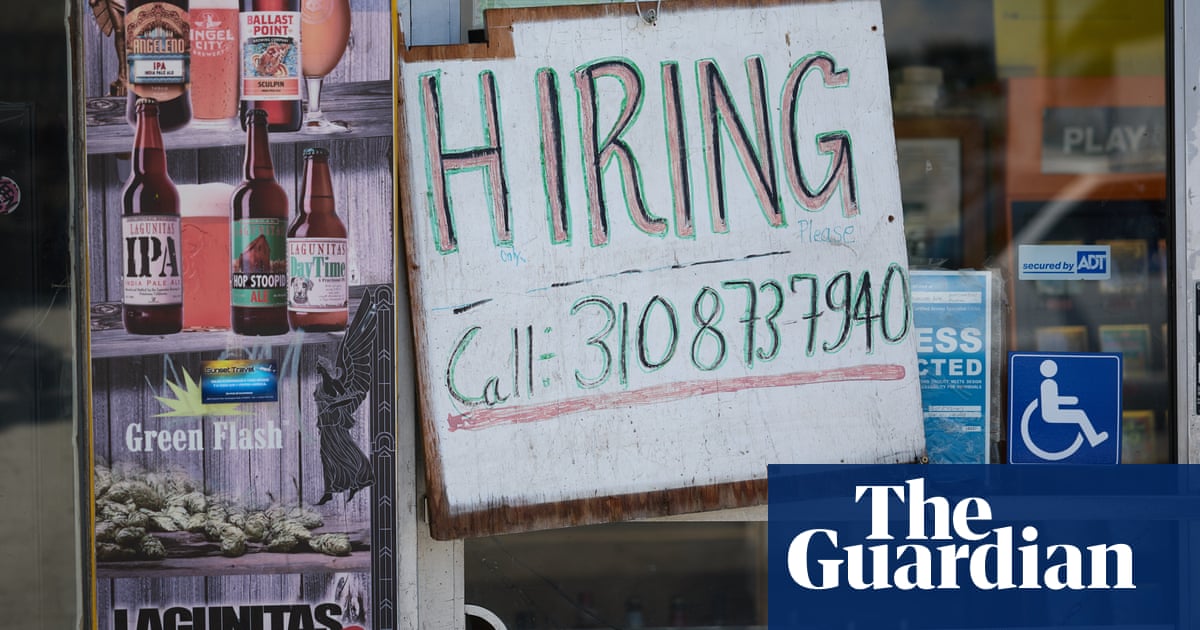US adds only 12,000 jobs in October in final report before election

The US added just 12,000 jobs in October, the last snapshot of the employment market before election day, in a report heavily impacted by the strike at Boeing and two recent hurricanes.
The unemployment rate was unchanged at 4.1%.
The closely watched jobs report is the last piece of economic news before next week’s election. Many polls report that the economy is the top issue for voters.
Economists had expected the temporary impacts from Hurricane Helene, Hurricane Milton and the ongoing strike by 33,000 Boeing workers in the Pacific north-west to reduce job growth numbers in October. But the number of jobs created was far lower than their estimate of 120,000 jobs for the month.
The US jobs market has been cooling after years of robust growth. October’s figure was the weakest since December 2020.
The White House’s council of economic advisers moved to downplay the poor jobs growth figures blaming the “distortionary factors” of the hurricane and Boeing strike. The number of people not at work due to bad weather rose by 460,000 in October, it said. “When the data signal gets jammed, look to the underlying trend,” the council added in a blog post.
In a statement, Joe Biden blamed the October reading on storm “devastation” and strikes. “Job growth is expected to rebound in November as our hurricane recovery and rebuilding efforts continue,” the US president said.
The US economy “remains strong, with 16 million jobs created since I took office”, Biden added. “There’s more work to do. We are working every day to lower costs for working families on rent, prescription drugs, health insurance, and child care.”
Job creation accelerated unexpectedly in September as the US added a revised 223,000 jobs, in the strongest month of jobs growth since March 2024. Until October the average number of jobs gained per month in 2024 has been about 200,000.
Manufacturing jobs fell by 46,000 in October, probably led by the strike at Boeing. Leisure and hospitality – usually a major source of new jobs – dropped 4,000 positions. The latest report from the labor department also shaved 120,000 jobs off August and September’s hiring totals.
“It is likely that payroll employment estimates in some industries were affected by the hurricanes; however, it is not possible to quantify the net effect on the over-the-month change in national employment, hours, or earnings estimates because the establishment survey is not designed to isolate effects from extreme weather events,” the labor department reported.
The continuing strength of the jobs market has surprised some economists who expected job losses as the Federal Reserve increased interest rates to tackle inflation.
The US now seems to be heading towards a “soft landing” with interest rates falling, the rate of inflation slowing and employers still hiring.
Inflation in the US hit a three-year low in August 2024, falling to its lowest level since February 2021, with the consumer price index annual rate at 2.5% ahead of the Federal Reserve’s first cut to interest rates since the start of the Covid-19 pandemic.
Polling, however, shows that Americans are deeply unhappy with the state of the economy and the cumulative price rises that they have experienced thanks to three years of high inflation.
And while economic indicators have shown a resilient, strong economy, Republican elected officials and Donald Trump have sought to portray the economy negatively.
Trump has falsely claimed the US currently has “the worst economy ever”. Last month, Biden pushed back on Republican claims that the last jobs report was fake, stating, “anything the Maga Republicans don’t like, they call ‘fake’. Anything. The job numbers are what the job numbers are.”
Related
U.S. economy adds jobs as federal layoffs and rising unemployment…
Julia Coronado: I think it's too early to say that the U.S. is heading to a recession. Certainly, we have seen the U.S. just continue t
The job listing site highlighting H-1B positions so Americans can…
A mysterious new job listings website recently went live, solely showing roles companies want to offer to their H-1B holders seeking Green Cards in an attempt t
Tepid February Jobs Report Boosts Odds of a June Fed…
Federal Reserve Board Chairman Jerome Powell speaks during a news conference. Photo by Chip ... [+] Somodevilla/Getty Images.Getty Images The February jobs repo
French university offers jobs to American scientists afraid of government…
As the current federal government in the U.S. has been freezing or cutting funding for several research grants, a French university has stepped in with an offer













